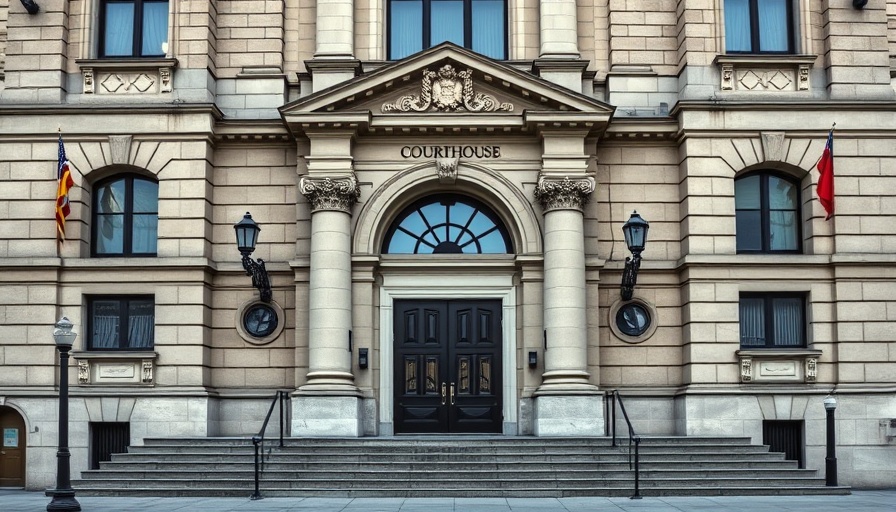
Congressional Actions: A Closer Look at Immigration Detention Oversight
In the wake of recent arrests and tension surrounding immigration enforcement policies, members of the Congressional Hispanic Caucus (CHC) have pledged to intensify their oversight activities at immigration detention centers throughout the United States. This commitment comes as a response to a chilling encounter involving several congressional Democrats, including New Jersey’s Newark Mayor Ras Baraka, who confronted U.S. Immigration and Customs Enforcement (ICE) officials during a visit to a detention center.
The CHC's call-to-action highlights a troubling narrative: many detainees are immigrants who lack any criminal background and are often apprehended while simply attending court hearings. New York's Rep. Nydia Velázquez expressed concern that these policies aim to punish individuals based solely on their immigration status, indicating a broader pattern of cruelty in current administration tactics.
The Legislative Landscape: Challenging Immigration Enforcement Funding
With congressional Republicans strategizing to funnel billions into immigration enforcement through a tax and spending bill, the CHC's role becomes increasingly vital. This potential legislation, bolstered by the process of reconciliation, could shift significant funds into detention operations, raising alarms among advocates for humane immigration policies.
Rep. Pramila Jayapal, a prominent figure within the CHC, has openly criticized the Trump administration for its reliance on private prison companies for the detention of migrants. She pointed out that these facilities often operate under conditions that would be unacceptable in civil detention centers, characterized by profit motives over the wellbeing of those detained.
Public Response and Community Activism
The backlash against immigration detention centers has reignited a passionate response from community organizers and advocacy groups across the nation. Demonstrations outside facilities like the one in Newark showcase public sentiment against detaining immigrants in for-profit institutions. Many advocates argue that current policies not only threaten the lives of immigrants but also undermine the core values of justice and fairness in the American legal system.
Residents of Pennsylvania have witnessed this activism firsthand, as local organizations rally public support for policies that grant asylum seekers and migrants protection rather than punishment. The urgency for reform in immigration practices resonates in communities where families face uncertainty daily.
Legal Ramifications: The Rights of Detained Immigrants
Amidst heightened scrutiny, it’s crucial to understand the legal framework that governs oversight visits to detention centers. Under existing appropriations laws, members of Congress are empowered to conduct unannounced inspections at any Department of Homeland Security facility housing detainees. This provision stands as a critical check against potential abuses that could emerge in privatized detention contexts.
Moreover, the new dynamics introduced by the potential legislative shifts could make this oversight more important than ever. If funding increases for these facilities, increased monitoring will be necessary to ensure humane conditions and accountability.
Future Implications: What Lies Ahead for Immigration Policy?
The pressure mounted by the CHC signifies a pivotal moment in U.S. immigration policy discourse. As they persist in their oversight efforts, the potential outcomes of current legislation on both political and social landscapes appear significant. Should Republicans succeed in their funding efforts, it could result in wider enforcement measures, exacerbating the challenges faced by immigrants across the country.
In essence, the continued scrutiny of immigration detention practices not only holds the administration accountable but also signals a critical juncture for civil rights advocacy. Depending on how policies unfold in the coming months, communities across Pennsylvania and beyond will remain vigilant, advocating for humane practices and the dignified treatment of immigrants.
Conclusion: Taking Action from Awareness
The CHC's commitment to increased oversight at detention centers emphasizes the importance of transparency and accountability in immigration enforcement. For residents of Pennsylvania and neighboring regions, staying informed and engaged in local advocacy efforts can help shape the future of immigration policy. Ensuring that our leaders hear community concerns is paramount.
As ongoing developments arise, now is the time to galvanize support for humane treatment policies. If you feel strongly about these issues, consider reaching out to your local representatives to express your views and promote actions that protect immigrant rights.
 Add Row
Add Row  Add
Add 




 Add Row
Add Row  Add
Add 

Write A Comment